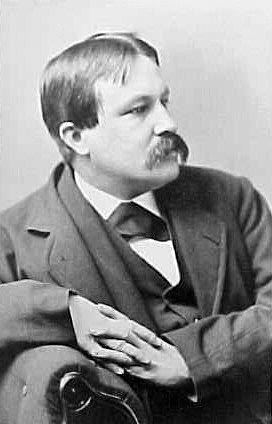
William Dean Howells (1837-1920), known in his lifetime, with a groaner of a pun on his middle name, as the Dean of American Letters, published “A Hazard of New Fortunes” in 1890. He was a novelist, essayist, and for many years, editor of the Atlantic Monthly. We don’t quite have his equivalent today — perhaps a cross between Robert Silvers or David Remnick and John Updike gets us in the right territory. Howells knew everyone in American letters, and that was when letters meant something.
Readers of the Kitchen may wonder why this old book, not something of the class of a work by Tolstoy or George Eliot, is being dredged up for inspection, but “Hazard” has the distinction of being about a central theme of this blog — new business models for the media industry. Indeed, “Hazard” is a novel that is in some respects so eerily contemporary that it makes you wonder what’s new about the new.
I first encountered Howells as an undergraduate, browsed around his work again in graduate school, and then pretty much forgot him. With all the talk nowadays about the need for new business models, whether for the New York Times, Barnes & Noble, or STM journals, it seemed appropriate to revisit this old friend.
The story begins when Fulkerson, who made some money in the syndication business, approaches Basil March with an idea for a new literary magazine. March, middle-aged and married, would seem like an unlikely candidate to join a start-up, but his career in the insurance industry (an apt choice of occupation) is about to take a bad turn, so March packs up his wife and family and heads to New York to start Every Other Week, a new literary magazine. Fulkerson soon introduces March to his backer — the venture capitalist of the tale — Dryfoos, who made a fortune in natural gas a full century before fracking. The plot turns on Dryfoos’s interference with March’s editorial prerogatives, which draws in other characters before the tale ends in tragedy precipitated by a labor strike.
Fulkerson’s big idea is to change the way publications pay writers. Instead of paying huge guaranteed sums, Every Other Week proposes to pay small or no fees to writers but to have writers share in the publication’s proceeds. It is strange to think of a time when the biggest cost of a serial publication was editorial rather than marketing and distribution, but Fulkerson’s innovative business model gets things going. Later, it is the editorial acumen of March and the ingenious work of the art director that make the magazine a success.
Is the new business model a success? Not really. Although Fulkerson and March start out by keeping editorial costs down, promising a share of revenues to writers, over time they begin to spend more and more to attract the kind of writing that will make the magazine stand out. This editorial program works, which serves to make the point that it is not new business models that account for success but having products that people want to read. “Hazard,” in other words, makes the case for the editorial imperative. Proponents of the notion that publishing is becoming a service business — focusing on facilitating content rather than creating it — may wish to consult Every Other Week for a contradicting example.
More than a century since the book’s publication, it is hard to imagine what the world was like when the launch of a new publication met with so much excitement, felt so central. Even the biggest publications nowadays — “The Hunger Games” trilogy or the soft porn “50 Shades of Grey” — are simply media programs like any other, the equivalent of a major sports event or a special episode of “Project Runway.” Howells wrote at a time when books meant something. We will never live in such a world again.
Nor, perhaps, will we ever share the novel’s unstated premise, that a book about starting a business, even a media business, could be exciting. This capitalist venture is presented without irony. It truly was a different time. It is hard to think of a single businessperson depicted in recent fiction who is not utterly repellent or astonishingly stupid. Howells came before the Fall.
Howells was a good but not a great novelist. Contemporary readers are likely to be drawn from the devotedly literary and those interested in Howell’s particular themes (such as the economics and politics of a media property). Most readers will put their energy into reading the much superior realist novels of Balzac and Zola. But for a sense of the history of media business models, “A Hazard of New Fortunes” holds a special place.
Discussion
1 Thought on "“A Hazard of New Fortunes” — A Review"
You’re right that Howells isn’t a fantastic novelist, but he is a keen observer of US society – particularly at that moment when the frontier closes. I haven’t read this novel, but read The Rise of Silas Lapham in college. The main topic there is of the distinction between new and old money. It is basically an early version of The Beverly Hillbillies, only instead of black gold, he discovers some sort of mineral paint that earns him a “new money” fortune. The most memorable scenes in the book – and perhaps the most relevant for the kitchen – are those that take place in the library of the new upper class family. Here, there are several conversations about having the books around merely as a decoration – as opposed to reading them. Some quotes on my blog here:
http://breakingculture.tumblr.com/post/16589288585/in-1930-simon-schuster-harcourt-brace-and
The “true” upper class visitors to the Lapham house look at the library with amusement and disdain because, although it has many of the “right” books, their owners have cracked few of them and therefore cannot engage in the kind of highly educated banter of those with old money.
In this sense, your comment that he lived in a time when books meant something is incredibly significant. There are many people who still believe that having books (or their digital equivalent) is important – particularly those who don’t have access to public libraries or, like one of my former students serving in Arkansas with Teach for America right now, to a public education system outfitted with the resources necessary for inculcating people with the “cultural capital” to help advance themselves and their community. On the other hand, I am sometimes divided on whether the fact that we seem to have moved beyond this – where 50 Shades is the main topic of many an upper middle class conversation (I guess because the prudes have never read soft porn…) – is an advance or a contraction on our culture.
I guess it is both and neither – but either way, it certainly changes the way we might think about the future prospects of publishing. The only recent project that I could think of that sounds like the literary magazine in this book was the re-launch of the Baffler earlier this year – which was only made possible by the infusion of $500k by MIT. The first two issues are of solid quality, but they are embracing what is becoming an outdated model in the “social media” landscape: they are paying their authors.



